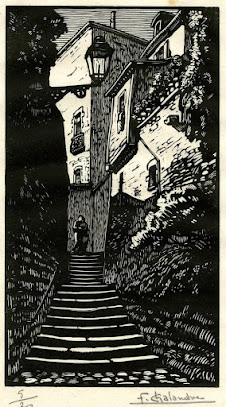Today’s block print artist is Fernand Chalandre (France, 1879-1924). Chalandre was born and spent most (or possibly all?) of his life in Nevers, France, where he was confined to a wheelchair, but nevertheless travelled all around his hometown sketching people and scenery and turning them into block prints. Looking at his views of Nevers I find the steep streets and staircases extremely scenic, but I imagine they must have been quite a challenge to navigate in a wheelchair.
Chalandre’s pieces are all rather small, and he also did quite a few bookplate designs (although I haven’t selected any of those to share today). Many of them show small scenes tightly cropped in interesting ways. For example, the first piece is a narrow slice of view which centers on a staircase. None of the buildings on either side are shown in their entirety. (By the way, the British Museum dates this piece to 1925, while telling me that Chalandre died in 1924. Since it’s signed by the artist, I don’t know what to make of this!) Another example is the church spire, which focusses tightly on the tower rather than showing the entirety of the church.
The second church spire, on the other hand, while still the focus of its piece, is actually in the background, the bulk of the church building obscured by the tree and house in the foreground. The various textures may seem somewhat roughly carved, but they actually work perfectly. Also, keep in mind that this piece is only 33x55 millimeters (about 1.5x2 inches) so in fact those are tiny little precision details.
You can see that the details increase when the size increases, in this view of another stone stairway, which is about 4.5x7.75 inches. I especially like the areas at the top: the lamp, the windows, the flowers on the right…
These are all listed as woodcuts, but the tiny size of them, and particularly the carving patterns of this last one, make me wonder whether they aren’t actually wood engravings instead. The rougher shapes on the ground look like they could be gouges, but the use of nothing but thin lines to depict shapes and textures is more characteristic of engraving. At any rate, I always love a moonlit scene, and this one is wonderfully serene.
Chalandre was a new discovery for me, and I’m very pleased to have made his acquaintance. I hope you enjoy his small, sensitively observed work as much as I do.
[Pictures: Nevers, Escalier Casse-Cou, woodcut by Fernand Chalandre, 1925;
Church spire with birds, woodcut by Chalandre, 1919;
Church in Cuffy, France, woodcut by Chalandre, 1919;
Stone steps, woodcut by Chalandre, 1925;
Moonlit landscape, woodcut by Chalandre, 1919 (All images from British Museum).]





No comments:
Post a Comment